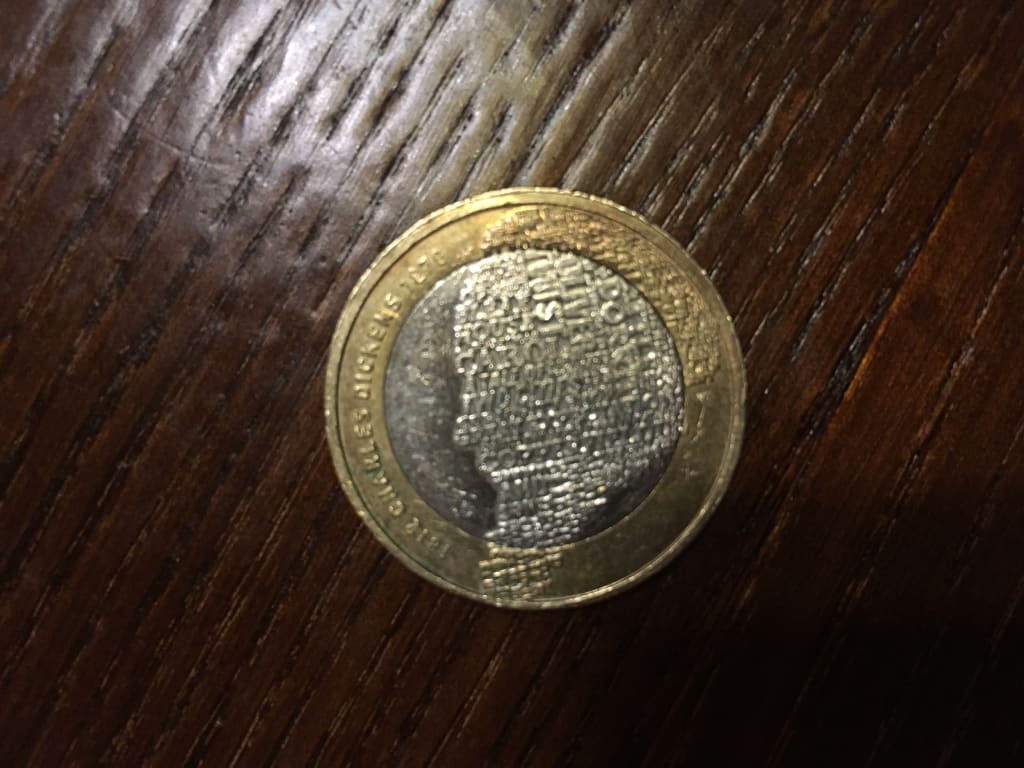
Dermot helped his mother onto the bus by her elbow. She was small now, sharp and firm like a porcelain doll. In her old age, she had shrunk to the size of a child, her back hunching over; the talon of a bird of prey.
“There you go now, mam,” he sighed.
“I’m not a dog.”
“Certainly not,” Dermot responded, sticking out his bottom lip. It was true: if she was an animal, it wasn’t a dog.
The Tallaght bus was an obscene beast: yellow and purple on the outside; inside, it was plastered with advertisements. A kaleidoscope of smiling faces – huge, round and white like ticking clocks – saying things like “Do you need a loan to pay the interest on your other loan?” or “Have you got an embarrassing physical ailment you’d like to make worse?” or “Have you financially prepared in case you unexpectedly die because God help you if you haven’t?” Buses on this line shuttled endlessly through the pebble-dash estates and shoe-box apartments of the suburb, slow and ubiquitous as slugs.
The pair found their seats, struggling against the movement of the bus like newbie astronauts. Pat made for the window, pushing ahead of her son with the same determination as a toddler galloping from its parents’ reach at the park. When she found her seat, she sat down forcefully, deflating like a cushion, her fabric and folds settling across the seat and rolling onto the next one. Now resigned to the aisle, Dermot pressed his side into his mother, trying to no avail to push her flesh back together like an accordion.
“I swear to God they make these seats narrower and narrower every day,” he grumbled, mostly to himself.
“Will you give over,” Pat hissed, “They get wider and wider. For the fatsos. People were slimmer back in the day. You used to be able to fit six seats across a bus like this, you did. Six seats. And now, how many? Four.” She dug into the last word, drawing out the ‘f’ with all the force of the wind of the Irish Sea.
It was unlikely buses had six-seat rows, Dermot ruminated, but he let this one go. Pat was getting on and most of what she said was superfluous to the real comings and goings of life.
“I spoke to Mary on the phone the other day.”
Dermot composed his face to appear interested.
“Do you remember her Deirdre?”
Dermot, unsure, nodded.
“Well, hasn’t the young one gone and got herself in the family way.”
“With who?”
“Your man.”
“Your man?” This could mean anyone.
“Your man from the garage.”
“Ah, sure.” Dermot knew none of these people but shook his head and sighed theatrically nevertheless. He continued: “You can’t put the cart before the horse,” because he knew that’s what she wanted to hear.
Pat nodded sombrely like a nun reciting her rosary. “Not a day goes by I don’t thank my lucky stars I had sons.”
Dermot smiled, this was as close to love as they came, and he was grateful for it. Pat loved her sons because they weren’t daughters, a fact indicative of her general propensity for finding happiness in comparison to the misfortune of others, as well as at the mercy of the ficklest of all forces: pure luck.
Pat breathed again, indicating another pointless anecdote was imminent.
“And that Deirdre, well, isn’t she a piece of work.” (The vehemence in Pat’s tone was not justified but certainly added drama.) “She’s after asking our Mary and her Thomas to buy her a flat! Can you believe it? Asking your parents to buy yourself a place after getting yourself pregnant an’ all. Jey-sus. The young ones today have no sense – not even expecting to buy their own home -“
Dermot hadn’t really been listening, but anytime his mother started stringing together another diatribe against his generation he just had to say something: “Ma, you never even bought your own home yourself. Da bought it. You never even worked.”
While Pat made various noises to express her disdain for his remark, Dermot bristled with self-congratulations. The fundamental hypocrisy of Pat’s life was the immense pride she fostered despite the modest standard of living she had always enjoyed. As the modern world hurtled away from her, the smallness of their family home (which had always been Dermot’s entire world) revealed itself. It was in the film of dust on the record player and the jangle of the carefully counted change in his mother’s arthritic hands.
The bus shuffled on and the weather grew more bitter. Hints of rain started to dash across the windows, snaking silver lines across the view. Tutting, Pat turned her attention to the change in her hand. She counted the coppers carefully, mumbling under her breath, forgetting and restarting. Dermot helped her and together they grouped the coins and added them up, briefly united by the simple practicality. Yes, she was lucky to have him.
Tucking the coins safely into her purse, she remembered the scratch-card. She pulled it out. They examined it wordlessly, smiling. This was one of their rituals – something they had shared when Dermot was just a boy on his journey to school.
“And what would you get? What would you get if you win?” she would say.
And he would answer something ridiculous: a million chocolate bars; a trip to the moon; a time machine to see the dinosaurs.
And she would think: a telephone; a colour TV; new school uniform.
“Might as well.” Dermot said, and took the card and a coin. They leant towards each other, angled together in an arch like rafters of a church. Pat placed her hands out flat like an open book, holding the card in place with her thumbs. The card was laminate and smooth, catching and glinting the fluorescent lights from the ceiling of the bus. Dermot pressed the coin tightly between his index finger and thumb, the grooves against his fingerprints, his hand remembering the shape from years upon years of scratching card after card. ‘How many?’ he wondered, imagining the bus filled to the brim, bursting at the window seams with failed cards.
They had two columns. Two chances. He started, as always, with the left. The silver came away while Pat blew away the dust, as if nursing the kindling of a fire.
Zero.
The pair shifted in their seats, disappointed. It was at this time that Dermot became aware, as is typical from time to time, of the weight of a stranger’s eyes observing him. You may be familiar with this feeling yourself. It is certainly not uncommon to find yourself under another’s watchful gaze and to rebuke it with a subtle narrowing of the eyes or shifting of position. But the stare of this particular stranger captured Dermot. There was a unique intensity to it, as if he was being ravished or consumed by the passenger with the black notebook. Those eyes were unmoving and yet, like the eyes of a painting, they followed him as he shifted, watching, absorbing. I opened my notebook, smoothing my fingers out over the blank pages.
What shall I do with him?
What shall I do with her?
I clicked my pen and considered my options. The outcome of the scratch-card will be momentous for the pair whether they win or lose. For me, on the other hand, the outcome is mute. I will make my journey alone, and depart unaffected regardless. So, how to choose? I scratch my thumbnail along the spine of the notebook and decide.
Meanwhile, Dermot has turned his attention back to the scratch-card. There was one column left. He started to scratch. Pat’s painful joints trembled against the pressure but she held firm, and they both breathed in simultaneously, hoping.
The number behind the silver revealed itself: €20,000. Unbelieving, they sat unmoving in a holy silence. Their hands were clutched together, palm to palm, in join prayer. Around them, the bus and all its passengers rumbled on through the suburban streets, their lives looping and looping like a coin twirling around a drain.
It would have been easy to miss their stop in the haze: to hurtle on; to surf the waves of the breaking and accelerating, out to sea.
However, there is another option; another outcome where the silver remains untouched.
When their stop arrived, Dermot stood quickly, the scratch-card unfinished. “Are ya ready mam?” he asked impatiently, bored of the journey, her company and this pointless tradition. Pat was still seated behind him, preoccupied with arranging her purse and her bag. Slowly, she reassembled her fleshy parts into an upright position.
“Dermot!” she called, but the breaks were calling too.
“Dermot! Dermot!”
A crowd was between them, pushing to escape the bus.
The breaking intensified.
“Are ya ready?” Dermot repeated, not looking behind. He was at the door ready to depart. The doors parted and he had one leg on the pavement before he heard the crash – the smash of the porcelain bones.
The passengers crowded onto the street with all the choppiness of a rough tide. Dermot’s face twisted anxiously, searching for his mother. It was into this frenzy that the stranger departed, invisible now in the cold rain.






Comments
There are no comments for this story
Be the first to respond and start the conversation.